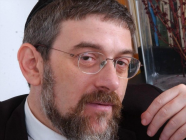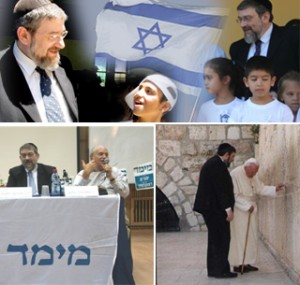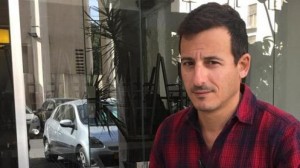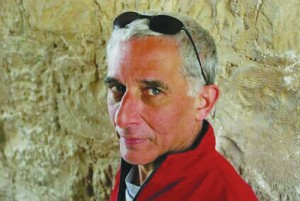
by Rabbi Michael Melchior
Rabbi Michael Melchior is a former Israeli cabinet minister, a former Knesset member and chairman of the
Education and Culture committee of the Knesset, an Orthodox Jewish scholar and a leading global interfaith activist
and environmental activist.

On one of my visits on Capitol Hill, I was invited to a debate with US legislators regarding the future of the
Middle East. After having presented my case, one of the senators expressed his utter surprise that somebody who is
an Orthodox rabbi, a staunch Zionist, and one who even looks like I look, could express views which he had always
been told were a betrayal of "Judaism."
The truth is I should not have been shocked by his reaction. Over the past 40 years, the Torah, Judaism, Zionism,
and at times even God Himself have been hijacked both in Israel and around the world, both by friends and foes, by
religious Jews and evangelical Christians. They have been hijacked by an extreme messianic ideology, in order to
advance a specific political agenda, which, if successful, I fear will mark the end of the Zionist dream and the
Jewish State. My deep disagreement with these people is not about Eretz Yisrael (the Land of Israel), the love of
the land and the concern for its future (although I do not always understand why this love only concerns borders
and not the environment inside these borders, or the dignity of the human beings living in this environment). Like
them, I have a deep affiliation with, and affection for, all parts of the land. And like them, part of me will feel
grief and sorrow the day we will have to give up Judea and Samaria.
My fundamental disagreement with them is about their interpretation of "Judaism." Judaism, like all religions,
embodies a very delicate balance between the particular and the universal. When being faithful to this balance, we
can contribute to a better world. But when distorting this balance, we will contribute to endangering the future
and the hopes of humankind.
I believe that those who have created priorities where love of the land supersedes love of man and of peace are
distorting the Torah. I believe that those who censor the Torah of such concepts as the natural morality of man, as
the belief that God has created every human being in His image, and as the basic human right to respect and dignity
which stems from this belief, are desecrating the Holy name of God. I believe in a Judaism which is great, broad,
and inclusive. I am committed to the ruling of our great teacher the Rambam (Maimonides) who states, when it comes
down to a conflict of priorities where saving human life is at stake, "and you shall observe my laws and my
statutes, which when a man performs, he shall live by them (Leviticus 18, 4) - live and not die by them, because
the statutes of the Torah are not vengeance in the world but mercy, loving kindness and peace." This is not an
abstract principle meant for festive speeches at inter-religious gatherings but a binding legal and moral
guideline, which has dominated Jewish thinking since we received the Torah at Mount Sinai.
I have often challenged my rabbinical colleagues to show me one single source from the "Jewish Bookshelf," the
Bible, the Talmud, the Rambam, the Shulchan Aruch, or the immense traditional rabbinical literature, which rules
that you cannot give up land in order to obtain peace. They have never been able to do so.
On the contrary, the Bible tells us that the builder of the first temple, King Solomon himself, gave up 20 cities
in northern Israel to King Chiram of Zor. He did this as an act of appreciation for the cedar trees that Chiram
contributed to the Temple. During the building of the second temple the immigrants from Babylon in the period of
the great leaders Ezra and Nehemiah decided not to include many cities in the new sovereignty of the land. This was
done so that the holiness of this sovereignty would not create an obstacle in facilitating charity extended to the
needy receiving social gifts of crops in the sabbatical year. We see that the possession of the land was put aside
not only to save lives but even for legitimate socioeconomic considerations.
And there were no "orange" demonstrations against this "betrayal" of the land.The prophets of Israel did not rally
much support in their day, but still today inspire and enrich humankind, Jew and non-Jew alike. They knew how to
stand up and talk truth to power and to kings. And what did they talk about? Did they talk about the borders of the
land? Or did they talk about justice and compassion? They were very clear about Jewish priorities.
The right of the Jewish people to self determination in its ancient homeland, to live with recognized, secure
borders, is one of the most just and moral causes in our time. However, to occupy and control the lives of millions
of Palestinians living in Judea and Samaria, and to negate their right to create their own state and future in
peace, side by side with the State of Israel, is not just, is not moral, and is not Judaism. There can be a
legitimate disagreement about how peace is to be obtained and who is to be blamed for having missed opportunities
in the past for reaching this peace. However, these disagreements have nothing to do with "Judaism" or the betrayal
of "Judaism." Those on both sides of the debate, who are turning the conflict into an existential conflict of
religion and theology, are doing so because they know that in doing this, they can prevent necessary compromise, or
any solution at all for that matter. Because who is going to be willing to compromise on the totality of God?
We have reached a tragic situation where the dream of the great messianic peace has become the main threat to
pragmatic and necessary agreements, which at least have the potential of providing a measure of peace and a future,
which both sides deserve and which can certainly save many precious human lives.
I believe that if religion has a redeeming force for humankind, then religious teachers and leaders must be on the
frontlines of the struggle to transform our conflicts and to work together for the greater good of our communities.
The good news is that there actually are a growing number of impressive and courageous people, including Jewish,
Christian, and Moslem leaders, who believe likewise - although their voices may still not be heard as loudly or as
distinctly as the voices of the totalitarian extremists. These are leaders who, like me, will feel a profound
measure of grief at having to give up and compromise on land that they believe is theirs. And yet this grief will
be overridden by the joy of hope: The hope of building a future together, dominated not by fear and hatred but by
optimism and commitment to the peace of Jerusalem.
All Jewish prayers ends with the beautiful prayer to God, that He who makes peace in His heavens, may assist us in
making peace on earth. When we express this prayer, we withdraw three steps, symbolically saying to the Almighty
that we cannot expect Him to intervene on our behalf if we are not willing to withdraw and leave room for the
"other." Yes, this might be a naïve and romantic message but I know no better alternative than an uncompromising
commitment to making this prayer our reality.

 Israel’s Peace Now movement today announced that Avi Buskila, a seasoned social activist and an
advertising and public affairs professional, has been hired as Peace Now’s new Director General. He is replacing
Yariv Oppenheimer, who has been the leader of Peace Now and the most recognizable public face of Israel’s peace
camp in the past 14 years.
Israel’s Peace Now movement today announced that Avi Buskila, a seasoned social activist and an
advertising and public affairs professional, has been hired as Peace Now’s new Director General. He is replacing
Yariv Oppenheimer, who has been the leader of Peace Now and the most recognizable public face of Israel’s peace
camp in the past 14 years.



 Our first edition is about Jerusalem focusing on The Temple Mount and is written by Danny
Seidemann. Who could find a better expert on Jerusalem? An attorney and world-renowned Jerusalem expert, Daniel
Seidemann is the director of Terrestrial Jerusalem, the NGO he founded.
Our first edition is about Jerusalem focusing on The Temple Mount and is written by Danny
Seidemann. Who could find a better expert on Jerusalem? An attorney and world-renowned Jerusalem expert, Daniel
Seidemann is the director of Terrestrial Jerusalem, the NGO he founded.